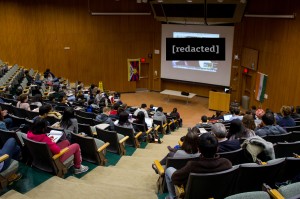Author Gordon Chang was joined via Google Hangout by two Members of Parliament (MPs) for the Central Tibetan Administration (CTA) and two Tibetan refugees living in Nepal in a panel held on Thursday, Nov. 6 to discuss the political state of Tibet.
The talk, entitled “Understanding the Tibetan Issue: Dialogue and Unity,” was organized by junior Se Hoon Kim and sponsored by the Undergraduate International Relations and Political Science Council, the Association for Development of Interest in the Indian Subcontinent, and the Hindu Students’ Association, among others.
Kim introduced the speakers and gave a brief presentation on Tibetan history. He detailed the ongoing struggle for Tibetan autonomy, which began in 1950 when the People’s Republic of China (PRC) invaded Tibet, which had previously been independent. In 1959, many Tibetans, including His Holiness the Dalai Lama, fled the country. Most fled to India and Nepal, though their treatment has been different in the two countries.
After he explained some of Tibet’s past, Kim introduced the guest speakers, starting with MPs Karma Yeshi and Dhardon Sharling, who were video-chatting from Dharamsala, India, and Boston, Massachusetts, respectively. Dharamsala, a city in the northern Indian state of Arunachal Pradesh, has been the home of the Tibetan government-in-exile since the 1959 exodus.
Founding Father and first Prime Minister of India Jawaharlal Nehru let the Tibetan refugees into India, and he has been admired by the Tibetan community ever since. The event was held in part to celebrate Nehru’s birthday on Nov.
14. To represent their cooperative relationship, both Indian and Tibetan flags were hung at the event.
Yeshi, a first-generation Tibetan-Indian, was born to parents who had to flee Tibet. Sharling is a second-generation Tibetan-Indian who, at 32, is the youngest-ever member of the Tibetan parliament-in-exile.
Kim then introduced Gordon Chang, author of the 2001 book “The Coming Collapse of China” and regular contributor to Forbes Magazine. Chang has predicted the collapse of the PRC several times in his book and since its publication. He has appeared as a pundit on TV talk shows to argue that China’s economic situation and relationship with the U.S. are weaker than they appear.
Finally, Kim introduced two Tibetan refugees living in Nepal. The refugees, who were video-chatting from their apartment in Kathmandu, did not use their real names for fear of the political repercussions of their statements. They used the names Sonam Pema and Tenzin Wangdue as their aliases.
Each of the panelists gave an opening statement, outlining their stances on the issue and their predictions for the near future.
Yeshi expanded on Tibetan history. He specifically described the Chinese government’s oppression of has beset upon Tibet, including teaching Mandarin Chinese instead of Tibetan in schools and crushing rebellions. Yeshi said that over 132 Tibetans have self-immolated in desperation, and yet the PRC is not working to resolve the issue.
Sharling described the Central Tibetan Administration’s official role in solving these problems. Sharling described the “mutually beneficial” Middle Way Approach, endorsed by the Dalai Lama, which “exists within the framework of the PRC.” The Middle Way Approach seeks, as its name suggests, a balance between full independence and the current situation.
The Dalai Lama and the CTA are no longer asking for independence. Instead, the movement is asking for increased autonomy within the PRC and, most importantly, a restoration of rights for Tibetans. In addition, Tibetan refugees would be able to return to their homeland with impunity. Sharling expressed that this is a solution that “1.3 billion people in China would identify with.”
Next, Pema talked about the situation of the Tibetans in Nepal. She said that Nepal and China have “one of the best diplomatic relationships in the world,” and that China provides “major economic support” to Nepal, which lies between Tibet, China, and India. Pema said that the PRC gives this money with the condition that Nepal prevent Tibetans from crossing their border and immigrating to India.
According to Pema, the Nepalese government also pursues Tibetan refugees by “arresting people on the street and knocking down doors.” One can be arrested for wearing a shirt with the word “Tibet” on it. The Nepalese police also “increased their presence” on March 10, the Dalai Lama’s birthday, a day of celebration for Tibetans.
Chang then came to the podium to give his opinion on the Tibetan issue. Chang used his perspective as a Chinese-American to convey that Han Chinese consider Tibetans one of the five ethnic groups that constitute China. The government in Beijing, “coveting the land of another people,” called their invasion of Tibet a “liberation.”
Chang described the PRC’s actions in Tibet as “colonization of one people by another,” and that the Chinese are “seeking total submission” from Tibetans. He explained the PRC’s attempts to integrate Tibet into mainland China by building a second railroad with the official purpose of “increasing tourism,” but he said he believes the true purpose is so that Beijing can more quickly bring in troops if necessary.
According to Chang, China’s imperialism doesn’t end in Tibet. Beijing calls the Indian state of Arunachal Pradesh “South Tibet” and has placed “two very large armies very close” to the border it shares with India.
Despite his acknowledgement of China’s displays of power, Chang repeatedly affirmed that “one day the regime [of the PRC] will have to withdraw.” Chang said that there are “too many things trying to change the status quo,” and that the “Chinese economy is on the verge of a debt crisis.”
Chang ended his speech by declaring that “we will see the Communist Party fail.” For Tibet, this means for Tibet that “the oppressors will become weak; the oppressed will become strong.”
Kadir is a member of
the class of 2017.



